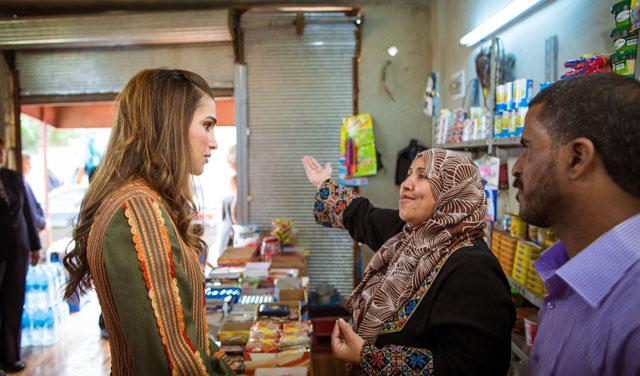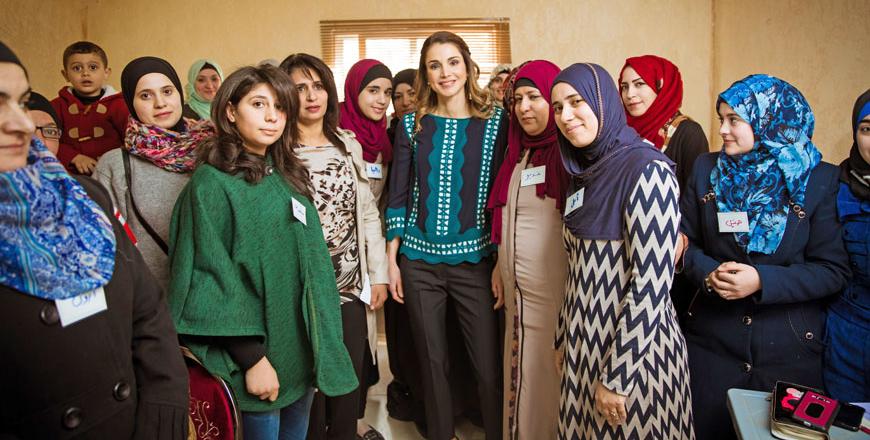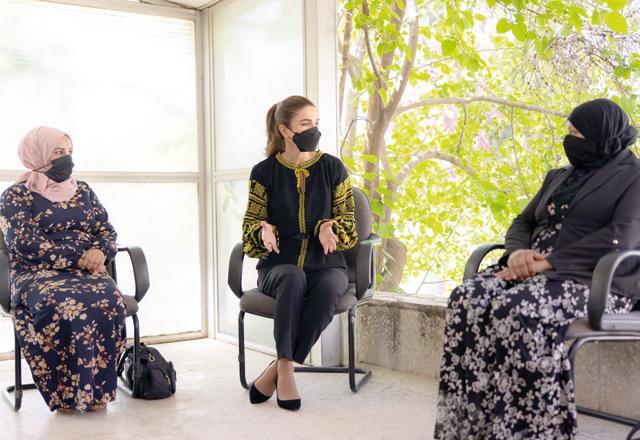You are here
Queen Rania visits Pella in Northern Ghor
By JT - Mar 30,2015 - Last updated at Mar 30,2015

AMMAN — Economic empowerment is “a tool for quality and positive change”, Her Majesty Queen Rania said Monday, noting that small projects that grow steadily can have ripple effects across the community.
The Queen was speaking during a visit to Pella District (also known as Tabaqet Fahel), 90km north of Amman, in Northern Ghor to highlight several success stories of small businesses run by women.
In Pella, Queen Rania met with several women residing in the area, including Um Yasmin and Um Ahmad. Both women are involved in small income-generating businesses and are working hard to succeed despite their harsh living conditions, according to a statement issued by Her Majesty's office.
The small businesses are supported by the Community Centres Association (CCA) in the area.
Her Majesty also dropped in on Tarfeh Al Anbar’s (Um Yasmin) house where she met with CCA Chairman Sari Naser and CCA President Firyal Saleh.
Anbar told Queen Rania about her project, where she sells a variety of house utilities from her home, and how the project has helped improve her family’s economic situation and support her daughter’s education.
Queen Rania then stopped by Iman Mustatiji’s small business — Um Ahmad’s mini-market.
Um Ahmad shared with Her Majesty her project’s small beginnings and how it has grown since.
The Queen conveyed His Majesty King Abdullah’s greetings to the people of the area and expressed his pride at hearing local successes stories.
“His Majesty is always keen on highlighting the competitive advantages of each area. Tabaqet Fahel is also a great location for agriculture and tourism, and residents can invest more in these qualities to attract more tourists, thus, benefiting its residents,” Her Majesty said.
She concluded her visit with a meeting with several women from the area at the Pella rest house.
In the meeting, several beneficiaries shared with Queen Rania the impact their projects have had on their socio-economic and living conditions, and they expressed their gratitude for the opportunities they have been given.
Through these projects the women were able to strengthen their self-confidence and provide new sources of income, ensuring better education opportunities for their children as well as helping their husbands with home expenses, the statement said.
The women also reported that the projects broke down the culture of shame and helped them rely on themselves while teaching them project management skills.
The women said they were proud to effect change within their community, and many were able to finish their education as a result of the income generated by these projects.
Through the establishment of an internal cooperative network, the products sold by the women have been marketed within the area, according to the statement.
Also at the meeting, Saleh said the women of the district are highly motivated, which has been reflected in the success rate of their projects, as some projects have generated profits just three months after establishment.
The CCA president highlighted that the women have also taken advantage of tourist attractions the area has to offer, and have started selling their products to tourists and visitors on weekends and public holidays.
So far, they have launched 11 agricultural and livestock projects, three grocery stores, and three other home and clothing projects, Saleh added.
At the meeting, Ehab Saleh, CCA project coordinator in Tabaqet Fahel, explained that the association trains women on how to manage small businesses and how to sustain and grow their start-up capital, generating more profit.
Pella is located in the northern part of the Jordan Valley with a population estimated at about 48,000 people. The area was one of the cities making up the Roman Decapolis League.
One of the key structures uncovered in Pella is the so-called Canaanite Temple, the largest and best preserved structure of its type in the region.
Occupied for over a millennia between 1800BC and 800BC, the site hosted a series of cultic activities that left behind several ritual vessels and offerings.
Experts attribute Pella’s attraction to its source of permanent freshwater springs, arable land for cultivating cereal crops and grazing cattle, isolated topography, and its location at the crossroads between the civilisations of the east, west, north and south.
Related Articles
AMMAN — Her Majesty Queen Rania visited Hashemiyat Al Zarqa district in Zarqa Governorate on Monday to check on the progress of a number of
AMMAN — Her Majesty Queen Rania met with owners of income-generating projects at the Community Centres Association (CCA) in Amman on Tuesday
AMMAN — Her Majesty Queen Rania visited a newly built vocational training academy run by the Community Centres Association (CCA) in Hai Nazz



















